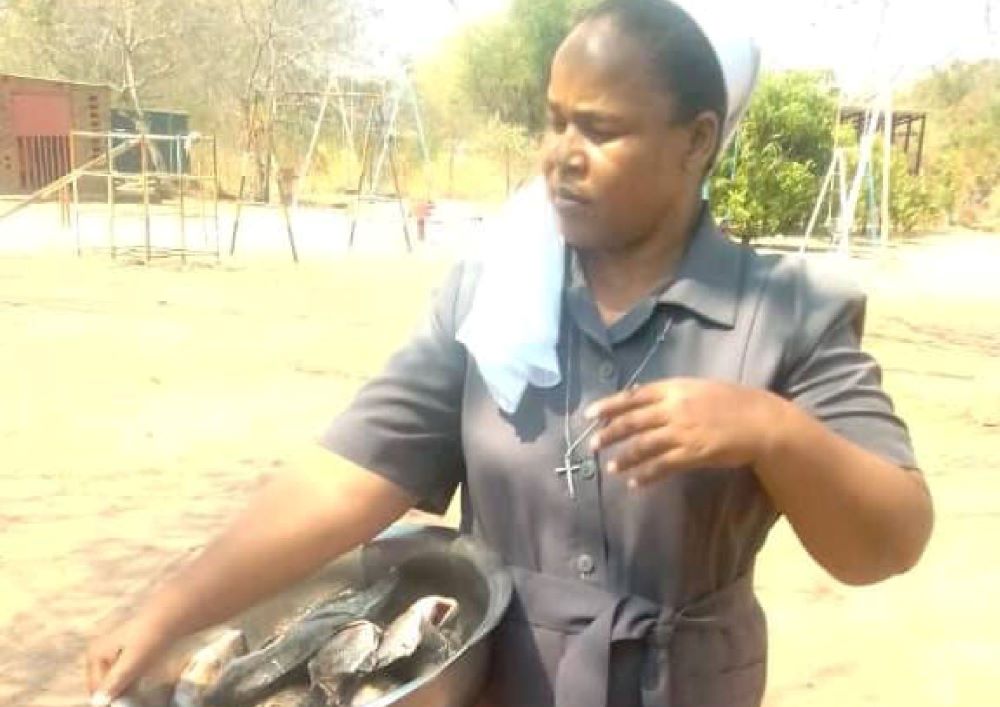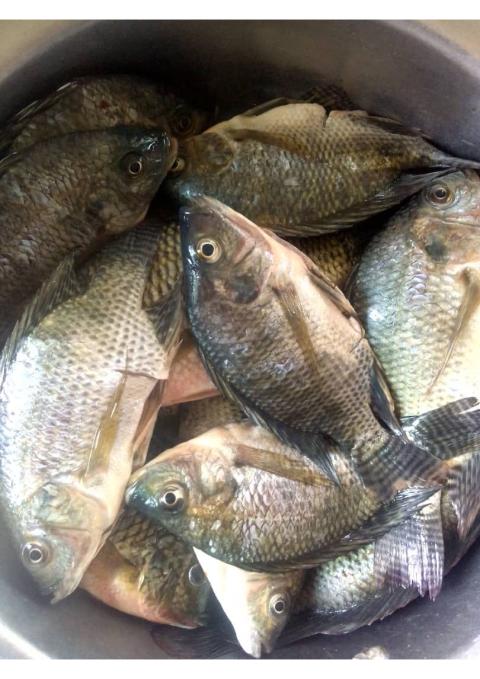
Sr. Bongani Fuyana, an assistant postulant mistress of the Missionary Daughters of Calvary in Zimbabwe, holds a large fish from the community's fish farm. (Courtesy of Ester Machekera)
I am a member of the Missionary Daughters of Calvary, an international congregation in Zimbabwe. I was born into a family of nine: five girls and four boys. We had two sets of twins, and I was fortunate to have a twin sister, but she died young. as did my parents. Losing them was a great loss as we were very close.
Our family lived in Gokwe Midlands Province of Zimbabwe, an important agricultural region known for cotton, peanuts and maize. My parents were subsistence farmers, so our entire family tilled the land and produced these crops that sustained the whole family. My siblings and I all attended primary and secondary schools in this rural setting, and our crops paid our high school fees. My experience of family farming during these growing up years developed my inclination toward agricultural economic activities.
Once I entered the convent, I earned a bachelor's degree in business management and information technology from the Catholic University of Zimbabwe.This education, along with my rural upbringing, led me to choose agriculture when I was appointed mistress of postulants for our province. I started a project to provide us with food and to generate income. From past experience, I knew that as the young women worked on this project, it would help them grow in all aspects of life: exercise, discipline, planning, follow-through and respect for the Earth and its gifts.
We chose organic farming because it is cost-effective and good for our soil, and we can sell the produce locally. We use compost to enrich our soil and to reduce costs and reliance on commercial fertilizers. Organic farming also relies on ecologically balanced agricultural principles like crop rotation, green manure, organic waste and biological pest control. All these methods have worked well for us. They also reflect our commitment to living out the values of Pope Francis' Laudato Si', the most comprehensive Vatican document to date on environmentalism, ethics and Christian faith. Pope Francis' concern for the environment has definitely impacted our choices in the way we grow food and use resources. We are mindful, too, that it is mostly the poor who experience pollution and lack of access to clean water, food, energy and other resources.
The pope reminds us that God created the world and entrusted it to us as a gift with a responsibility to care for and protect it and all people who share it.

A recent harvest of bream fish came from the sisters' pond, which has more than 2,000 fish from the Zambezi River, one of the largest rivers in the country. (Courtesy of Ester Machekera)
It is not easy to bring these concepts to others, as many of our farmers are preoccupied with the challenges our country faces today: persistent inflation due to poor governance, low agricultural productivity, slow infrastructure transformation and intermittent periods of drought. Natural disasters, such as flooding, cyclones and rising temperatures, have caused many problems, including homelessness. These issues, along with the COVID-19 pandemic, have contributed to Zimbabwe's increasing poverty and vulnerability. Families are going hungry and numbers of young people, desperate for work, are often forced into early marriages and drug use to cope with depression.
The government has done very little for redevelopment of the country since we gained independence from Britain in 1980. We suffer from almost constant power outages that raise the cost of running universities, colleges, high schools and all other educational institutions forced to use generators. Students are unable to study when there is no electricity and internet available for their work. Lack of regular electricity seriously impacts access to drinking water. This national failure to adequately invest in electrical power has ushered in an entire era of blackouts, sometimes up to 20 hours at a time. The excuse is that the cuts are due to low power-generation capacity and breakdowns of aging machinery. However, nothing is done to address these issues.
Not only are institutions and factories impacted by these shortages, but they also take a serious toll on everyday life in Zimbabwe, including access to household drinking water, a dangerous situation especially during the hot seasons. Food production, both home gardening and larger agricultural ventures, are affected negatively, causing less production and higher prices for food.
Advertisement
Even traffic is affected. Without traffic lights, traffic jams and accidents increase. The poor, as usual, are deeply affected by these daily limits. Without access to any energy systems, they have increasingly resorted to cutting down trees for firewood, which only adds to the climate crisis.
Having young women in our congregation is a blessing and encouragement. Our postulants are young, energetic women, and we foster in them a sense of responsibility to work hard in order to eat well and share with others. We are committed to joining our efforts with other Zimbabwean women who typically provide food for families and local communities. We stress that access to healthy food is important for our children in school and the health of the community as a whole and that good farming practices can lead to better health.
Because of the need for more protein in our diets,we decided to begin fish farming for the following reasons:
- Farmers can select the fish species with their desired characteristics.
- Ponds are secured by fencing and, therefore, not accessible to outsiders who attempt to harvest at will.
- Ponds close to the convent require less cost for transportation.
- Fish are a high source of protein for nutritional value.
- Integrating fish farming into the existing farm creates additional income and improves water management.
Our fish pond has more than 2,000 bream fish from the Zambezi River, one of the largest rivers in the country. We had our first harvest in April this year. At the moment, the ponds are overcrowded, so we are planning to extend the pond.
Being very pleased with the postulants' enthusiasm and to keep them motivated, I have given them responsibility to feed and harvest the fish and take turns monitoring the farm as well as the sale of produce. They share the dream that local farmers will see the new methods of farming we are teaching and will want to follow our lead in using them for the good of the Earth and climate.









